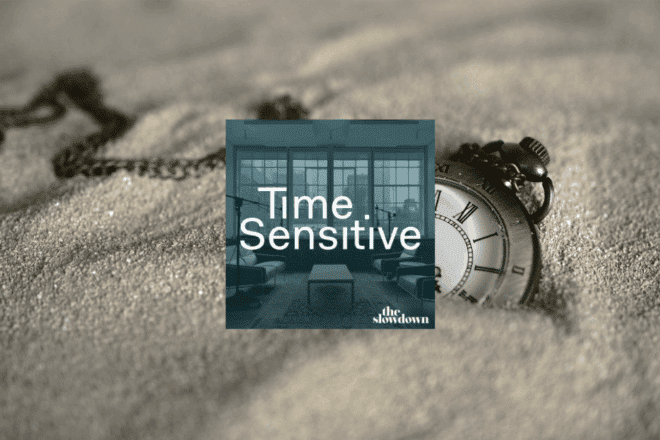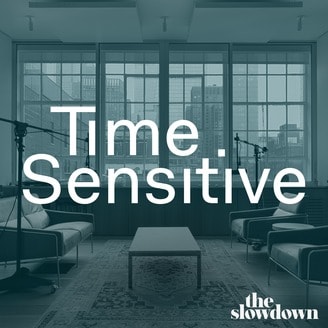Podcast Spotlight: Time Sensitive


Watches around the world may disagree, but we all know the concept of time can be subjective. Who hasn’t had a weekend “just fly by”? Time Sensitive explores the different perspectives creative and courageous minds have of time. Co-hosts Spencer Bailey and Andrew Zuckerman interview designers, writers, and artists in all senses of the word on their creative process and how time moves for them. Conversations not only cover creating things while in the flow, but they also examine different ways of looking at society in the past, present, and future. Guests discuss their childhoods, influences, work process, and hopes for the future. Bailey and Zuckerman actively listen and ask thoughtful questions, pursuing even deeper topics and learning something new about their guests each time.
If you are caught up in the rat race and looking for ways to slow down, Time Sensitive is for you. Visit timesensitive.fm to view chapters, transcripts and links from each conversation in case time got away from you and there’s something you missed.
We were fortunate to talk with Andrew Zuckerman and Spencer Bailey about the podcast, how they differentiate from other podcasts, and their future plans in podcasting. See below for our full Q&A.
Listen: Apple Podcasts | Stitcher | Spotify | Podchaser
DISCOVER PODS: How’d you get into podcasting?
ZUCKERMAN AND BAILEY: We believe that conversation is at the core of all social change, and that podcasts are the perfect container to explore thematic conversations with an audience in a sustained way that grows over time.
The Slowdown was born out of a concern for the untenable speed at which we were going—and the economic, social, and political externalities of that speed. A consistent thread we’re finding through the biggest thinkers in our culture right now is that they’re all recognizing that speed is a major source for our loss of agency. Speed, in other words, has been weaponized. We chose to create a media company around the idea of slowing down not as a prescriptive health and wellness platform, but as a vehicle to capture and share ideas and behaviors surrounding this burgeoning but fractured movement.
One of our core missions is to foster conversation. A podcast was the obvious medium to get that going.
DISCOVER PODS: In your own words, why should listeners tune in to Time Sensitive?
ZUCKERMAN AND BAILEY: It depends on how you define “tune in.” We’ve developed Time Sensitive as a multisensory experience. On our website, timesensitive.fm, you can not only listen to the podcast, but also read a condensed and edited transcript with hyperlinks, and see archival imagery that relates to the conversation, offering a deeper level of engagement.
Time Sensitive is, on the one hand, about being a part of the conversation—we work very hard to ensure the audio quality helps listeners feel like they’re with us in the room. On the other hand, it’s also highly curated. The guests are not random. They’re chosen by us in a sensitive way to ensure that the stories we’re highlighting sit at the nexus of culture, nature, and the future, and to offer surprising and insightful perspectives.
DISCOVER PODS: What kind of feedback have you heard from your listeners?
ZUCKERMAN AND BAILEY: We’re frequently hearing from listeners all over the world that the podcast offers them inspiration and encouragement. Many of them say they take notes while listening and replay the episodes multiple times. We also often hear that they enjoy reading the transcripts and engaging with the visuals on our site.
DISCOVER PODS: Describe your recording set up. What equipment are you using?
ZUCKERMAN AND BAILEY: We record every episode in our Manhattan sound studio with two Electro-Voice RE20 microphones, two Cloudlifters, a Universal Audio 6176 microphone preamplifier, a Universal Audio LA-610 Mk II microphone preamplifier, and an RME Fireface UFX. All of this equipment is great, but what it really comes down to in the end is the room.
DISCOVER PODS: What’s the biggest challenge you face as an indie podcaster?
ZUCKERMAN AND BAILEY: Making the economics of the whole thing work. To produce quality, you need a strong team, both in research and production. Finding ways to monetize this in a responsible way—while still making everything at a high level—takes a big vision and a lot of effort.
DISCOVER PODS: Where do you want to take your podcast?
ZUCKERMAN AND BAILEY: We don’t really have a big agenda or markers that we’re interested in hitting from a data perspective. We just feel fortunate to be making this kind of content, to be able to sit down with these incredible guests, and ultimately to share it with a highly receptive audience.
DISCOVER PODS: What other podcasts are you listening to now?
ZUCKERMAN AND BAILEY: We both listen to The Daily from The New York Times. Andrew enjoys Intercepted with Jeremy Scahill and liked S Town a lot. Spencer frequently listens to Longform, Fresh Air with Terry Gross, and The New Yorker Radio Hour. He recently finished listening to Floodlines from The Atlantic.
DISCOVER PODS: Anything else you’d like to add?
ZUCKERMAN AND BAILEY: We’d like to mention that, due to the Covid-19 pandemic, we’ve put future recordings of Time Sensitive on hold until we can get back into the studio. In the meantime, we’ve launched a new podcast, At a Distance, which we’re recording remotely from our home studios—Andrew upstate, Spencer in Brooklyn. Each episode, which is around a half hour long, looks at the big picture and features leading minds in science, philosophy, psychology, economics, the arts, and beyond, providing a whole-earth, long-view perspective as we move through—and look past—the pandemic.













Comments
Comments are closed.